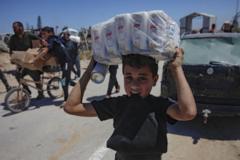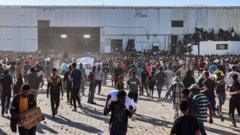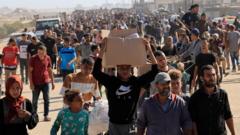The Gaza Humanitarian Foundation (GHF), positioned to directly deliver aid to residents, has recently commenced operations, claiming it has started distributing food from secured locations. However, the measures have drawn criticism for potentially undermining established humanitarian principles and excluding vulnerable populations.
New Aid Group in Gaza Claims Distribution Has Begun Amid Controversies

New Aid Group in Gaza Claims Distribution Has Begun Amid Controversies
A newly formed group backed by the US and Israel has initiated aid distribution in Gaza, raising concerns among humanitarian organizations about its implications.
The GHF announced on Monday that they are distributing food in Gaza following the arrival of trucks filled with aid. This new organization, supported by American armed security, aims to navigate around the United Nations, which has traditionally overseen humanitarian aid in the region. The GHF did not disclose the specifics regarding the volume of aid distributed or the number of beneficiaries.
While GHF reported their operations were underway, the UN and various NGOs have opted not to engage with the new system, asserting that it contradicts core humanitarian standards and risks politicizing aid. This skepticism is fueled by the ongoing humanitarian crisis in Gaza exacerbated by an Israeli blockade enforced for 11 weeks, prompting concerns about looming famine.
In a statement, the GHF indicated their intention to provide aid to approximately a million Palestinians within the week. However, they faced immediate backlash after former executive director Jake Wood resigned, emphasizing that their strategy could not align with humanitarian ideals. In an attempt to regain credibility, the organization appointed John Acree, a former USAID manager, as the interim executive director.
Aid will be distributed from a handful of Secure Distribution Sites primarily in southern Gaza, guarded by American contractors, while Israeli troops patrol their peripheries. This structure has drawn ire from humanitarian groups that express fears over accessibility for those physically unable to reach these locations, including the elderly and those with disabilities.
Simultaneously, Hamas has warned residents against engaging with the GHF, describing its approach as a weaponization of aid under the guise of humanitarian relief. The continuous Israeli military operations and previous food blockades have severely impacted Gaza's food security, with a recent UN report showing that as many as half a million individuals might face starvation soon.
As tensions escalate, humanitarian organizations emphasize their readiness to provide aid that respects fundamental principles, warning that the ongoing conditions could worsen the humanitarian situation rather than alleviate it.
While GHF reported their operations were underway, the UN and various NGOs have opted not to engage with the new system, asserting that it contradicts core humanitarian standards and risks politicizing aid. This skepticism is fueled by the ongoing humanitarian crisis in Gaza exacerbated by an Israeli blockade enforced for 11 weeks, prompting concerns about looming famine.
In a statement, the GHF indicated their intention to provide aid to approximately a million Palestinians within the week. However, they faced immediate backlash after former executive director Jake Wood resigned, emphasizing that their strategy could not align with humanitarian ideals. In an attempt to regain credibility, the organization appointed John Acree, a former USAID manager, as the interim executive director.
Aid will be distributed from a handful of Secure Distribution Sites primarily in southern Gaza, guarded by American contractors, while Israeli troops patrol their peripheries. This structure has drawn ire from humanitarian groups that express fears over accessibility for those physically unable to reach these locations, including the elderly and those with disabilities.
Simultaneously, Hamas has warned residents against engaging with the GHF, describing its approach as a weaponization of aid under the guise of humanitarian relief. The continuous Israeli military operations and previous food blockades have severely impacted Gaza's food security, with a recent UN report showing that as many as half a million individuals might face starvation soon.
As tensions escalate, humanitarian organizations emphasize their readiness to provide aid that respects fundamental principles, warning that the ongoing conditions could worsen the humanitarian situation rather than alleviate it.




















